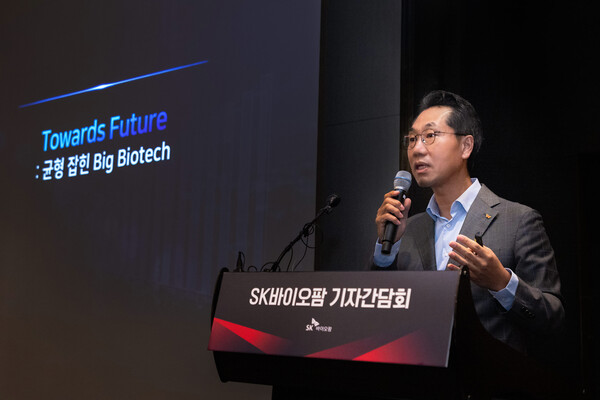SK Biopharmaceuticals, the company behind the successful 2020 launch of epilepsy treatment cenobamate (U.S. product name: Xcopri) in the U.S., is now setting its sights on becoming a well-rounded big biotech enterprise.

Speaking at a press conference on Tuesday, SK biopharmaceuticals CEO Lee Dong-hoon presented the company's plans to take a second leap forward based on the strong cash generation capabilities of cenobamate and the direct sales organization it has built to sell it in the U.S.
"The strategy is to add new pipelines and expand into platform-based biotechnology based on the cash generated from cenobamate, which has a gross profit margin ratio of over 90 percent, until when the patent expires in 2032," Lee said.
According to Lee, the number of monthly prescriptions for cenobamate in the U.S. exceeded 20,000 in May.
"At this rate, the company is expected to break even by the end of the year, meaning that more than 90 percent of sales from next year will be returned to the company," Lee said. "With margins in the mid-90s, I am confident that cenobamate will be able to generate 3 to 4 trillion won ($2.3 billion-$3.1 billion) in cash until its patent expires in 2032."
In 2022, SK Biopharmaceuticals' revenue plummetted 50.8 percent on-year to 456.7 billion won ($362 million).
Lee emphasized the potential for SK Biopharmaceuticals' existing sales organization in the U.S. to contribute to ongoing growth by facilitating the entry of other Korean firms into the American market.
He highlighted, "With a limited number of Asian biotech companies having established sales organizations in the U.S., our expertise in successfully launching cenobamate amid the challenges of the Covid-19 pandemic positions us as a valuable partner for Korean biopharmaceutical firms seeking to expand into the U.S."
Expanding portfolio beyond cenobamate
Using the cash it acquired from selling cenobamate, the company plans to acquire a second commercialized product by 2025 and take full advantage of the U.S. direct sales infrastructure.
"The idea is to acquire products that are close to commercialization, so that they can start generating revenue within a year or two," Lee said.
As a company with the latest innovative drug development platform, we plan to expand our portfolio from small molecules to biopharmaceuticals and from psychoneurological drugs to anticancer drugs, he said.
To this end, the company is exploring opportunities in three areas – targeted protein degradation (TPD), radiopharmaceutical therapy (RPT), and cell and gene therapy (CGT).
Lee explained that the company's recent acquisition of Proteovant Sciences, a U.S. joint venture established by SK and Roivant in March 2020, which has a global-level TPD technology, is an example of its efforts to expand its portfolio.
"TPD is a technology that solves the root cause of diseases by degrading and removing target proteins, overcoming the limitations of existing therapies," he said. "Through the acquisition of Proteovant, SK biopharmaceutical plans to globalize its research capabilities and secure platform technologies to become a leader in the field."
In the field of RPT, the company plans to strengthen cooperation with TerraPower, a U.S. nuclear power company that SK group has invested in, to enter the U.S. market and preempt the Asian market quickly.
"RPT is next-generation anticancer treatments that bind radioactive isotopes that kill cells to targeted substances and administer trace amounts to the body," Lee said. "Through such cooperation, SK biopharmaceuticals plans to become the largest RPT company in Asia."
Lee also stressed that the company is exploring opportunities in the CGT market.
"With stable cash generation, expansion into three new modalities – TPD, RPT, and CGT --, and fast decision-making and open innovation, the company will grow into a top-tier, balanced global big biotech worth $15 billion by 2026," Lee added.
Related articles
- SK biopharmaceuticals to acquire JV Proteovant ‘to secure TPD technology’
- SK Biopharmaceuticals narrows operating loss in Q1
- Why did SK Biopharmaceuticals sell cenobamate’s Middle East, North Africa sales right for only ₩4 billion?
- SK biopharmaceuticals, Korea Cancer Center Hospital to develop radiopharmaceutical therapy
- SK biopharmaceuticals still in red despite solid sales growth of epilepsy drug
- SK biopharmaceuticals extends patent rights for Xcopri until 2032

